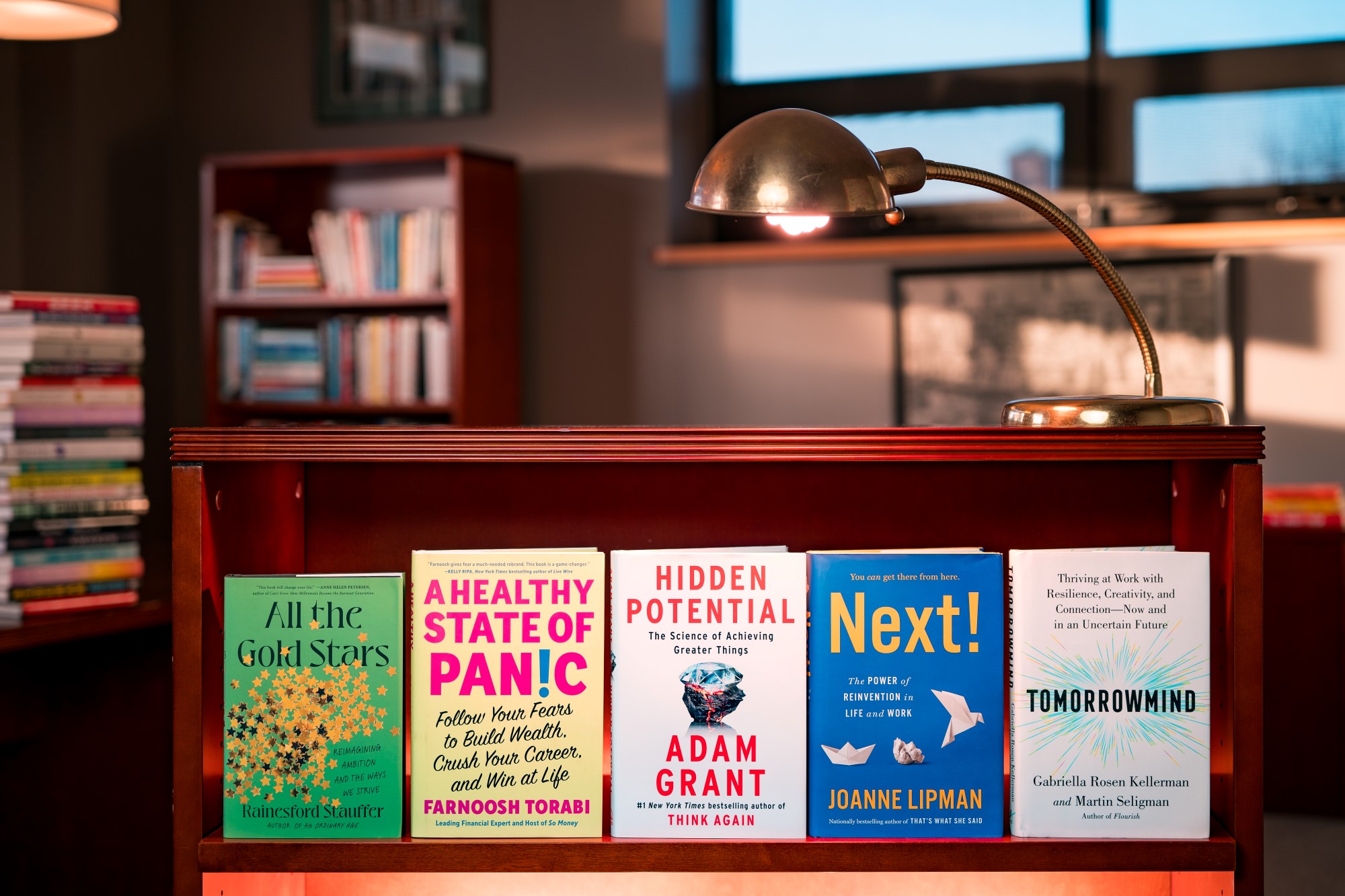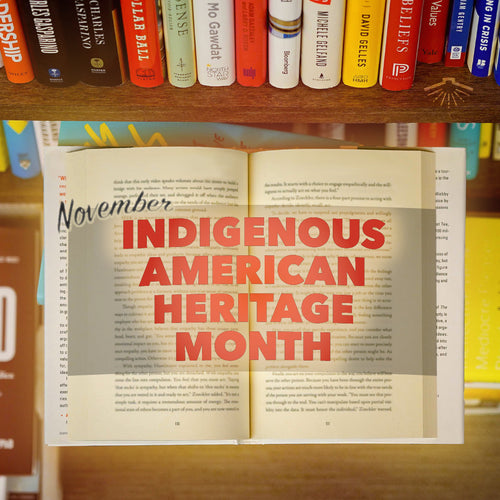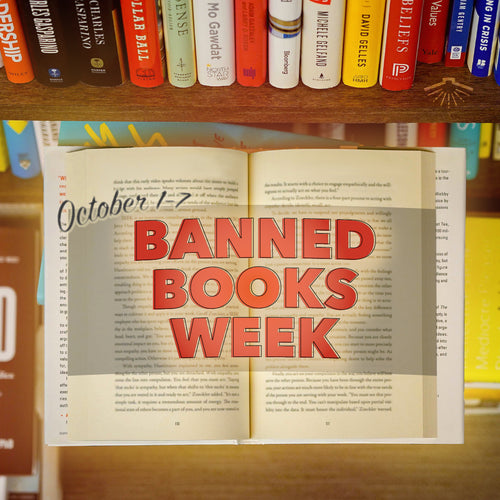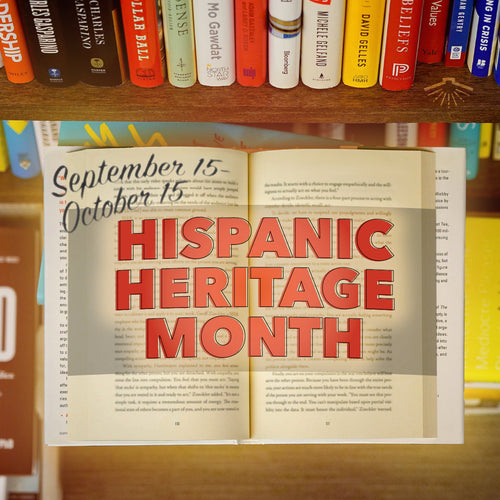The 2023 Porchlight Business Book Awards | Personal Development & Human Behavior
The whole world feels (and maybe has always felt) out of control, so it makes sense that many books in the personal development and human behavior category are about taking back power, practicing self-determination, building up resiliency, and embracing what makes you strive, what makes you hope, what makes you human. But besides balancing out the emotions thrown off-balance by our unpredictable world, these books also show how our quirks, fears, imperfections, unpredictability, and capacity to embrace rather than run from reinvention are our best features.
It’s very hard to determine what makes a book “the best” in any category, but for those in Personal Development & Human Behavior, I paid a lot of attention to the honesty, the diligence, and the compassion present in the authors’ works. This decision was very much influenced by Adam Grant’s thesis in Hidden Potential: that possessing aspirational character traits is more important than talent. Of course, publishing a book (period) takes a whole lot of aspiration, but in a category as personal as Personal Development & Human Behavior, I leaned toward the authors whose personalities shine through their writing, and whose books can uplift a diverse group of readers.
Whatever your background or career path, I believe there are multiple books on this list that will speak to you and help you and the company you keep (or work for) move toward a better future.
Additionally: This year’s Awards directive—books in conversation, not competition—helped me recognize similar themes throughout many of the category’s entries. I recommend or connect books within my writeups but mostly in the “What to read with...” section after each selection.

All the Gold Stars: Reimagining Ambition and the Ways We Strive by Rainesford Stauffer, Hachette Go
This is a validating, insightful, and ultimately freeing book for those of us who identify with the "former gifted and talented kid" memes, those who identify as anxious achievers, and those who wish to raise, lead, or teach high-achievers.
All the Gold Stars is a cross-cultural, multi-generational, societal history and examination of ambition—as the source of sin, achievements, cruelty, creativity, and service. It’s about author Rainesford Stauffer’s personal relationship with ambition, and how other parts of her life—her undiagnosed chronic illness, her career-centric identity, her delayed trauma-trauma processing—had been affected by the addictive recognition that comes with going above-and-beyond. All the Gold Stars presents a great variety of examples of how all our lives are touched (or, more accurately, wrestled to the ground) by the pressure to be ambitious.
The book is more reflective and investigative than prescriptive. I could imagine a section at the end of each chapter—the kind with bullet-pointed main points and actionable steps to take or exercises to practice—but maybe all it would need to say is “stop trying so hard.” By refusing to simplify a solution, All the Gold Stars encourages readers to take meaningful steps to progress, teaching process over output.
“Eventually, after we spend enough time asking the important questions—What matters to us? What fulfills us? What could we choose if we could choose anything at all?—we move closer to clarity on our own internal bench-marks, as [staff psychologist at Stanford University, Dr. Meag-gan] O'Reilly called them.”
And there is a lot to process in All the Gold Stars. Stauffer covers how capitalism impacts care work and parenting, how the timing of lifetime milestones is dependent on personal attributes and familial history, how the criteria for an ideal worker are rooted in classicism and racism, and other unflattering revelations about the standards we hold for ourselves and others.
Stauffer’s book recalibrates our ambition and puts into perspective the important things we’re saying no to (friends, hobbies, communities) when we keep saying yes to the systemic pressures of work, financial worth, and conformity. All the Gold Stars will give you clarity on better choosing where to place those yes’s and those no’s.
Read an excerpt from All the Gold Stars.
WHAT TO READ WITH ALL THE GOLD STARS:
Hidden Potential by Adam Grant could help you further a healthy relationship to your ambitions and abilities.
A Healthy State of Panic: Follow Your Fears to Build Wealth, Crush Your Career, and Win at Life by Farnoosh Torabi, Atria Books
The subtitle to Farnoosh Torabi's new book promises a lot, but her impressive resume will assuage any skepticism you have: She's written for Money magazine and Oprah, published several finance books, and now produces and hosts her own podcast “So Money.” As soon as I began reading A Healthy State of Panic, I was hooked and convinced that Torabi could motivate me, inform me, and support me in anything that I undertook.
One of the recurring themes in this year's Personal Development & Human Behavior submissions was how to be happy: with yourself, with your job, with your life. And where there is the desire for happiness, there is often also fear holding us back from happiness. For that reason, a book dedicated to connecting with and understanding our fears is a staple in our personal and financial journeys.
And while there are many wealth-building books out there, A Healthy State of Panic is a refreshing addition to the genre. Every chapter is a pleasant surprise of part-coming-of-age memoir and part-financial consult. The book provides many windows into Farnoosh Torabi’s life that make me trust her as an author and identify with her as a human, and makes her advice achievable:
“My family’s fearsome approach to life—while full of limitations—didn’t upend me. Instead, it equipped me with ninja-like street smarts that later helped me cut through so much of the world’s bullshit. From the ridiculing hallways of middle school to the beer-stained frat houses of Penn State to sexist and demeaning newsrooms, fear has been my guide, a steady source of wisdom, that has clarified my self-image and revealed my natural strength and power. It teaches me to respect myself and to live (happily!) on my own terms. In short, fear has made me who I am today.”
A Healthy State of Panic teaches us about nine main types of fears, how to face them head-on, and how to navigate life in consideration of and despite those fears. “Those fears” being: rejection, loneliness, missing out, exposure, uncertainty, money, failure, endings, and loss of freedom. Torabi shares many of her own firsthand stories as well as from guests on her podcast, but no matter the source, she handles the stories with great care and compassion. In this way, the book’s narration models how Torabi wants us to lead, narrate, and reflect on our own stories.
Read an excerpt from A Healthy State of Panic.
WHAT TO READ WITH A HEALTHY STATE OF PANIC:
Farnoosh Torabi highlights how, despite the many mistakes she’s made in her life, her ability to learn from those mistakes may be the greatest skill she’s honed. This makes her a model example of the power of tenacity that Adam Grant explores in Hidden Potential.
For more on fear: Seek by Scott Shigeoka explores all the ways fear manifests and how curiosity can help you overcome it, and All the Gold Stars by Rainesford Stauffer unravels the history of how striving for perfection (and our fears of imperfection) hold us back.
Hidden Potential: The Science of Achieving Greater Things by Adam Grant, Viking
Reading Hidden Potential is a feel-good experience that informs, uplifts, unsticks, and transforms how we support ourselves and each other.
"although talent is evenly distributed, opportunity is not."
Hidden Potential assembles evidence across the spectrums of age, gender, and ethnicity that contends we need to put a lot more effort into supporting good learners (rather than just gifted learners) as well as good teachers, coaches, managers, and leaders. And that building a relationship between the learners and the teachers is key to success:
"Rigorous experiments with over 15,000 students reveal that nurturing a growth mindset among high schoolers boosts their grades only when their teachers recognize their potential and their schools have cultures of embracing challenges."
Grant carves accessible paths through each chapter with engaging examples and powerful evidence paired with applicable advice. What makes this book so important is that it gives readers a much-needed perspective on their skill-based self-worth. All the “you can be anything you want”s that we heard as kids were subsequently drowned out by the positive reinforcements to continue doing the things we’re good at. Or if that wasn’t your experience, there is also the extreme lack of positive reinforcement to continue trying after we fail.
Grant’s book provides what he calls the “scaffolding” to adopting and implementing the character skills necessary to nurture potential and, further, how to build environments that will function as opportunity-nurturing spaces. Each chapter explores a different element of skill-building such as how to make practice feel not so monotonous, when to back up and when to move forward, why you should seek out multiple mentors, the power of taking a detour, and more.
Examples of opportunity-nurturing spaces in the book include brainstorming meetings where ideas are shared anonymously in a group, organizations built with a lattice system hierarchy instead of a ladder system, college admissions officers and hiring managers that look for "uncut gems" rather than "polished diamonds" of students and employees,
"[W]hen we judge potential, we often focus on execution and ignore degree of difficulty. We inadvertently favor candidates who aced easy tasks and dismiss those who passed taxing trials. We don’t see the skills they’ve developed to overcome obstacles— especially the skills that don’t show up on a resume."
As much as this can be a self-help book, there is greater potential for those who read this book to create more equal systems of opportunity. Better understanding how to unlock our own potential is just the first step to revealing the potential in students, teams, and organizations.
Read an excerpt from Hidden Potential.
WHAT TO READ WITH HIDDEN POTENTIAL:
This year’s Awards selections feature several books that tackle inequality—Building a Pro-Black World by Cyndi Suarez and the Staff at NPQ, Transformative Negotiation by Sarah Federman, Working to Restore by Esha Chhabra—and Hidden Potential is an uplifting read that compliments that subject, offering insights that can help any of us teach and support others at any skill level.
Additionally, while Grant’s book can help us achieve our greatest potential, All the Gold Stars by Rainesford Stauffer helps us keep ourselves level-headed about our endeavors, offering a comprehensive analysis of how our relationship to ambition can be harmful.
Next!: The Power of Reinvention in Life and Work by Joanne Lipman, Mariner Books
Here at Porchlight, we’ve seen a lot of books in the past few years about the changing world of work and the adjustments companies must make to stay afloat in this volatile post-COVID world. Meanwhile, many employees are stuck in a liminal space—their relationship to their job has shifted because their jobs themselves have shifted. But there are also plenty of personal reasons that anyone will want to switch jobs or even entire career paths, the pandemic notwithstanding. Whatever your reason, Joanne Lipman’s book Next! will help you take your next career steps with confidence and a sober understanding of what to be prepared for with those next steps—as they are named in the book: search→struggle→stop→solution.
Lipman lets the stories of individuals’ career searches, struggles, stops, and solutions play out, making each story as educational as it is engaging. I silently cheered on each subject as they, at fifty or fifteen or anywhere in between, had their own coming-of-age moments of clarity. Each example has the storybook ending we hope for, the kind that is an exciting new beginning, and Lipman narrates the journey to that point clearly and analytically, but with an appropriate emotional edge.
“Every chapter of his life—his theater training, his fascination with aviation, his love of travel, even his college major—came together in his new career.”
Lipman includes unique examples like Chris, a shoe designer who begins as a telephone repairman; Alan, a very skilled professional musician who goes back to school for finance; and Khemaridh Hy, who quit his soul-sucking job at BlackRock without a backup plan, but ended up building a brand with his weekly newsletter "RadReads." There are also more well-known cases like James Patterson’s long journey from advertising CEO to bestselling author, or Kathryn Finney's evolution from "Budgetnista" to founder of a venture fund and tech incubator (P.S. Porchlight honored her book Build the Damn Thing as one of the best Innovation & Creativity books at last year Awards). Lipman’s examples build on each other, and she brings some subjects up multiple times throughout the book, showing how each point she makes about career pivots applies to different situations.
And with each subject’s unique pain point comes a different catalyst to change. Robert Lutz and his team estimate their “outsider status” was the perspective they needed to pitch the initially outlandish but successful Dodge Viper. Management experts find that listening to your intuition can lead to better results than overthinking details. James Patterson cites challenging himself to try different things as an important practice that leads to greater transformation.
As for getting to the point that you decide what you’re transforming into, Lipman provides guidance:
“Some people are wired for eureka moments and seem to have creative brainstorms with ease. Not so much for the rest of us. The good news, though, is that we can create the conditions under which we’re more likely to have them. Scientists have pinpointed three especially key factors: distraction, relaxation, and a positive mood.”
You'll come away from reading Next! feeling much more ready to take the next steps towards your own eureka moment.
WHAT TO READ WITH NEXT!:
If you’re done tackling your own career pivot, shift the focus to leading more incremental, company-wide pivots, week-by-week, in Move Fast and Fix Things by Anne Morriss and Frances Frei. For more practice on unsticking your ideas, reading The Creative Act by Rick Rubin is an immersion into various creative mindsets.
Tomorrowmind: Thriving at Work with Resilience, Creativity, and Connection—Now and in an Uncertain Future by Gabriella Rosen Kellerman & Martin Seligman, Atria Books
I began reading Tomorrowmind not at all sure how it would tackle a subject as big as futureproofing our careers, but I was engaged from page one. Authors Gabriella Rosen Kellerman and Martin Seligman analyze and communicate mass amounts of data and behavioral science in an organized and digestible way. And they manage to do so in an overall positive, hopeful tone, despite the fact that:
“We can expect to rebuild from zero not once, not twice, but many times throughout our careers. We can expect to learn new job skills, only to see them fall into disuse, or transfer to machines. We will be reinventing ourselves every day.”
Tomorrowmind teaches us the whys and hows of training our brains to be more resilient, innovative, and happy in order to thrive, rather than fall by the wayside of technology, in our rapidly-changing world.
The book begins with an overview of the evolution of work and how humans have had to adapt so quickly to new ways of working since the Industrial Revolution. These evolutions are mentioned throughout the book, reminding us of the many ways we’ve transformed and boosting our morale for the individual and collective transformations that lie ahead:
“We have come by these skills honestly, as a species, through millions of years of evolving for the forager life. But we have drifted from using them since the Agricultural Revolution. With farming, and then industrialization, our roles got narrower and our work activities more predetermined. Today, once again, we need the cognitive agility and adaptability of a forager to flex in response to the rapids of the whitewater workplace. In this setting, we read currents, analyze context, and leave ourselves as many options as possible so we don’t get stuck.”
It’s a bit ironic how the skills that humans honed as foragers are what will get us through the robot revolution!
The authors highlight the many layers of skills and knowledge that separate us from machines, calling these the PRISM powers: “Prospection; Resilience and agility; Innovation and creativity; Social connection by way of rapid rapport; and Mattering.” The authors note that creativity is a throughline through nearly all of these skills, so this is a good place to remind you to browse our list of the best five innovation & creativity books of this year too.
Beyond what individuals can do to prepare for the future of work, there is also plenty of guidance for organizations on how to retain employees, such as centering meaning at work:
“What it means to matter at work must look different for us today than in years past, particularly with job tenure decreasing to a few years or less. We need to feel that we matter sooner; and we need to be able to redefine that sense of mattering frequently as our roles change. Organizations and individuals need interventions to fill our mattering cups in this new context.”
The analyses and advice in the book are thorough, level-headed, and human-centric, making it applicable to a wide range of readers. And even without the threat of robots taking over our jobs, applying the advice from Tomorrowmind could make our workplaces and organizations more innovative and resilient than ever.
Read an excerpt from Tomorrowmind.
WHAT TO READ WITH TOMORROWMIND:
A recurring theme this year was the speed at which people are thinking, acting, and reacting and how that affects our problem-solving and progress. And most people are in agreement that our thinking outpaces our acting. In Tomorrowmind, the authors emphasize that adequate planning is an important characteristic of successful creative teams. Frances Frei and Anne Morriss’s Move Fast and Fix Things recommends taking time to plan and prepare for taking action throughout four days of the week, reserving only the last day to “move fast.” This way, “you're far more likely to pull it all off and far less likely to break things along the way.”
In The Idea is the Easy Part, author Brian Dovey pushes for entrepreneurs to set and follow realistic timelines to make a good business pitch to VCs.
You can see these approaches and insights come together, and see what happens when they’re not adhered to, in Bent Flyvbjerg and Dan Gardner’s How Big Things Get Done. By examining both successful and ill-fated projects—across industries, across history, and across the world—this book gives you a comprehensive understanding of the many factors that influence a project's outcome. From planning, experienced teams, funding, project type, and more.
And if you just really like reading psychologically-backed books, you’ll love Your Brain on Art.



